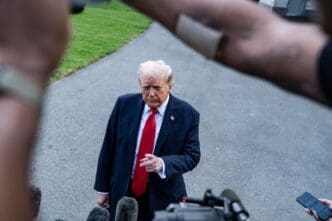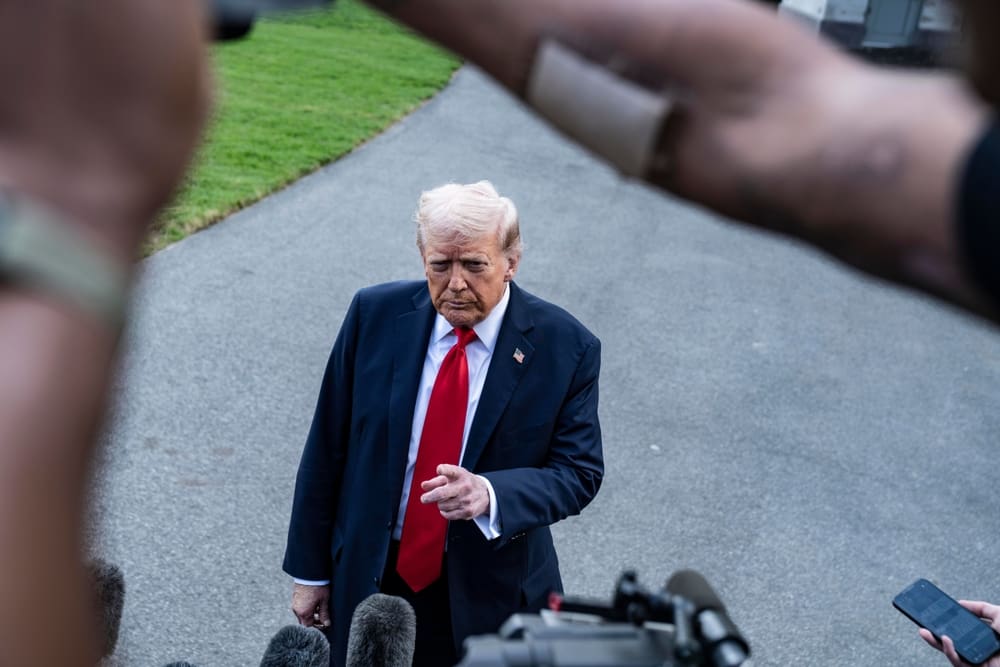Executive Summary
- The Trump administration is intensifying pressure on corporations, particularly media outlets, leveraging regulatory power and financial interests to suppress speech deemed unfavorable, as seen with the indefinite suspension of Jimmy Kimmel’s show.
- This pressure extends beyond media, with numerous companies across various industries yielding to the Trump administration’s political demands and culture-war tactics, often prioritizing stability over political engagement.
- The administration’s aggressive use of leverage is fundamentally altering the landscape of American corporate life, reshaping the relationship between political power and corporate autonomy and raising concerns about the erosion of free speech and democratic “guardrails.”
The Story So Far
- The Trump administration is actively leveraging governmental authority, including threats to public broadcast licenses and influence over corporate mergers, to compel media and other companies to suppress speech critical of the administration. This pressure is causing corporations to yield due to financial interests and a desire to avoid alienating politically active consumer bases, reflecting a shift in conservative politics where a “MAGA cancel culture” is fused with government power to enforce submission and silence critics.
Why This Matters
- The Trump administration’s alleged aggressive use of regulatory and political leverage is compelling corporations to yield to pressure, leading to the cancellation of shows like Jimmy Kimmel’s and a broader chilling effect on corporate free speech and autonomy. This trend signifies a significant redefinition of the relationship between political power and corporate independence, potentially eroding democratic “guardrails” as government authority is used to influence and suppress critical voices across various industries.
Who Thinks What?
- President Trump and his administration are actively leveraging government authority, including FCC threats and merger approvals, to pressure corporations into silencing critics and aligning with his political agenda, viewing this as a necessary measure against perceived political opponents.
- Many corporations, including media giants like ABC/Disney and Paramount/CBS, are largely yielding to the Trump administration’s pressure due to significant financial interests, such as securing merger approvals or protecting broadcast licenses, often leading them to restrict content or alter business practices.
- Critics and observers view the Trump administration’s actions as an authoritarian crackdown on free speech, an erosion of democratic “guardrails,” and a concerning fusion of government authority with “MAGA cancel culture” that compels corporate submission.
The Trump administration’s alleged crackdown on free speech within corporate America has intensified, most notably with the indefinite suspension of Jimmy Kimmel’s late-night ABC talk show. This move follows Kimmel’s claims that the administration, right-wing media, and the MAGA movement were attempting to manipulate the alleged killer’s motivations in the wake of Charlie Kirk’s assassination for political gain, signaling a broader trend of corporations yielding to political pressure.
Kimmel Suspension and Corporate Yielding
The decision to pull Kimmel’s show off the air came swiftly after Federal Communications Commission (FCC) Chair Brendan Carr issued a direct threat to ABC and its affiliates. Carr implied that public broadcast licenses could be jeopardized if action was not taken against the comedian, who has frequently satirized Trump on his program.
This swift compliance is partly attributed to financial interests. Nexstar, an affiliate group that reportedly threatened to drop Kimmel’s show, is currently seeking Trump administration approval for a significant merger with another station conglomerate, Tegna. ABC’s parent company, Disney, ultimately bowed to the pressure within hours.
Legal avenues for Kimmel to challenge his removal are limited, as ABC could terminate his show based on contractual arrangements. The administration’s control over public airwaves grants it leverage that would be absent if Kimmel were on a cable network or social media platform. While ABC and its parent could argue First Amendment rights, the public nature of Carr’s threat made the cost of resistance clear.
Broader Corporate Landscape and Free Speech
Beyond the media industry, corporations are increasingly navigating a complex political landscape, often opting to avoid alienating politically active consumer bases and advertisers. This environment, described as a cultural vibe shift by the source article, leads many firms to prioritize stability over political engagement.
An example of this pressure emerged with the departure of Jerry Greenfield, co-founder of Ben & Jerry’s. Greenfield reportedly accused the parent company, Unilever, of restricting the ice cream brand’s ability to speak out on political issues, despite its long history of social advocacy.
The Trump administration is also described as wielding aggressive power, which critics characterize as authoritarian, to influence media mega-mergers and consolidation. This leverage is reportedly being used to silence speech it deems unfavorable and to impose political will on companies that drive economic wealth.
This marks a notable shift in conservative politics. Historically, prominent conservative figures, including Trump, have criticized censorship, but the current “MAGA cancel culture” is presented as fused with government authority to suppress critics and compel corporate submission.
Administration’s Wider Campaign
The pressure on corporate entities aligns with a broader campaign by the Trump administration against perceived political opponents. President Trump recently vowed to crack down on Antifa, an umbrella group of far-left organizations, claiming without evidence that it finances domestic terrorism. The administration has also attributed political rhetoric leading to Kirk’s killing to left-wing groups and Democrats.
The article notes that President Trump’s actions, which some argue are anti-constitutional, occurred while he was at Windsor Castle. This detail draws a historical parallel to the British monarchy whose decrees, 250 years ago, sparked the American revolution.
Corporate Compliance and Consequences
The corporate world has largely proven adaptable to these pressures, often more so than law firms and universities. Companies are choosing to submit, with the article suggesting the pain of resistance encourages a strongman president to seek new targets, potentially eroding “guardrails of a democratic society,” including First Amendment rights.
In another instance, President Trump achieved a settlement in a lawsuit against “60 Minutes.” This legal action coincided with an ongoing merger between CBS’s parent company, Paramount, and Skydance. With billions at stake, then-Paramount boss Shari Redstone reportedly opted for a settlement with the administration.
CBS also canceled “The Late Show With Stephen Colbert,” citing cost cuts. However, many media commentators suggest this decision was aimed at silencing another prominent critic of President Trump.
Beyond Media: Culture Warfare in Other Industries
President Trump’s influence extends beyond the media, leveraging culture-war politics across various industries, sometimes as a diversion from political challenges such as the Jeffrey Epstein scandal and slowing US job creation. His intervention in a Cracker Barrel logo change, which was subsequently reversed, highlighted his impact on consumer-facing brands, particularly those in rural, Republican-leaning areas.
Other companies are also reportedly bending to the administration’s demands. In July, President Trump announced that Coca-Cola would produce a version of its classic soda using US-cultivated cane sugar, aligning with MAGA and MAHA values.
President Trump has also directly intervened in US businesses, departing from traditions of non-interference. He reportedly demanded and received a revenue-sharing stake for the US government from chip maker Nvidia. Similarly, when he threatened tariffs on Apple, CEO Tim Cook reportedly visited the Oval Office with a gold-plated sculpture for the president.
However, yielding to political currents can also have drawbacks. Target faced a consumer boycott and a dip in share price after it scaled back diversity, equity, and inclusion (DEI) efforts that drew criticism from the administration. This incident underscored how corporate responses to political pressure can alienate other segments of their consumer base.
The article points out that the cultural and political pendulum can swing sharply. Only a few years prior, US firms were actively implementing DEI programs and embracing liberal causes, particularly after the Black Lives Matter protests in 2020. While conservatives currently hold sway, the administration’s aggressive actions raise the possibility of future reverse pivots against right-wing causes under a Democratic presidency.
Outlook
For the foreseeable future, President Trump’s aggressive use of leverage over US companies and media outlets is poised to profoundly alter the landscape of American corporate life. The ongoing trend suggests a significant redefinition of the relationship between political power and corporate autonomy.








